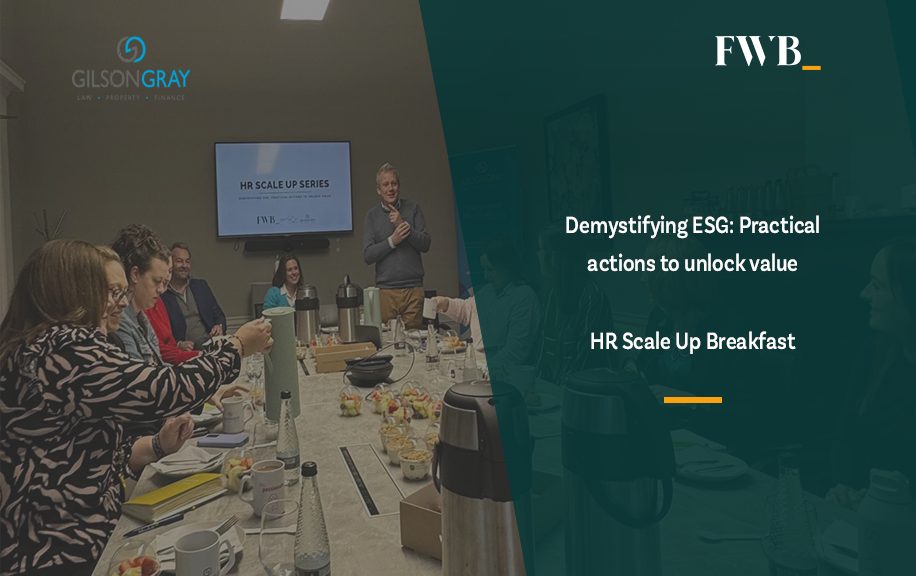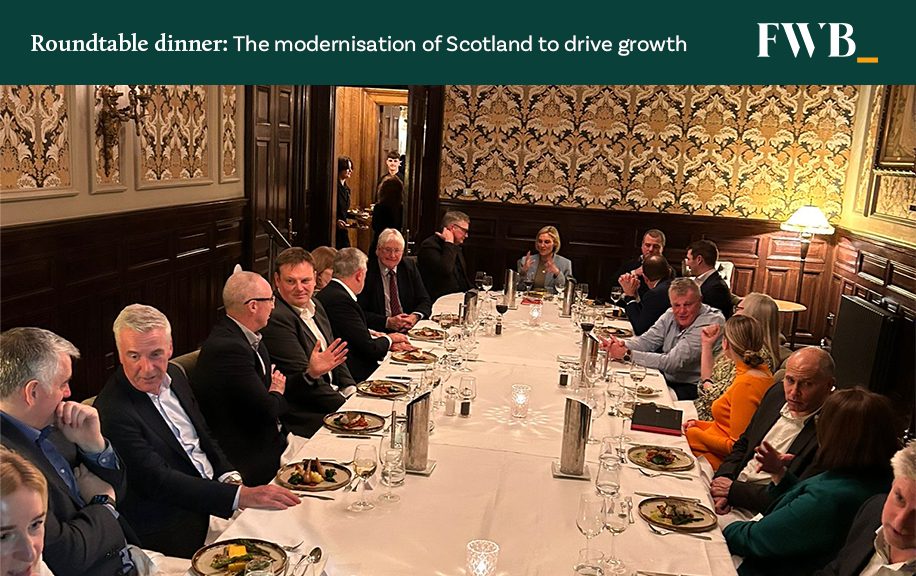Contact the team at FWB to discuss your individual or company requirements, or to discover more about our specialist services.
Demystifying ESG: Practical actions to unlock value.
28 March 2024
- FWB Events

In a world increasingly shaped by environmental and social challenges, the conversation around sustainable business practices has never been more pertinent. Yesterday, FWB had the privilege of hosting Nick and Emma Walford, founders of Perigon Partners, for an enlightening discussion on demystifying ESG (Environmental, Social, and Governance) and navigating the evolving landscape of sustainability.
One of the first insights shared was the shifting terminology from ESG to ‘Sustainability’. The ‘G’ in ESG, traditionally denoting governance, now finds itself somewhat misplaced in the evolving discourse. Instead, the focus is shifting towards broader environmental and social considerations, reflecting on a more holistic approach to sustainability.
Central to the discussion were the key themes underpinning sustainability: global inequality, resource usage, and climate change. These interconnected issues exacerbate one another, highlighting the urgency for businesses to address them collectively. At its core, sustainability revolves around three fundamental pillars: people, planet, and economic prosperity.
However, embracing sustainability is not without its challenges. Our guests highlighted confusion stemming from reporting requirements and a plethora of acronyms among other aspects of elements of ESG. Similarly, temporal myopia, a human tendency to prioritise short-term gains over long-term sustainability, presents a significant hurdle. Overcoming these challenges requires a shift in mindset and behaviour, aligning sustainability strategies more closely with corporate values and core business objectives.
A valuable tool discussed during the event was value chain analysis, which provides insights into how each stage of the chain impacts people and the planet. By understanding these dependencies, businesses can identify areas for improvement and value creation. Whether it’s reducing costs, increasing revenue, or accessing capacity, sustainability objectives offer tangible benefits across the board.
To operationalise sustainability, the discussion emphasised categorising initiatives into three buckets: compliance, credibility, and impact. Compliance represents the baseline requirements, while credibility initiatives signal a commitment to broader sustainability goals. Ultimately, impact-driven initiatives aim for lasting, positive transformation within organisations and society at large.
During the Q&A session, participants raised concerns about the broad scope of sustainability and its applicability across different business sectors. The consensus was clear: start simple, focus on value, and align sustainability efforts with the organisations’ purpose and mission. Holding executives accountable for sustainability goals can also drive meaningful change from the top down.
In conclusion, successful sustainability strategies require a concentrated effort from businesses to prioritise long-term value creation over short-term goals. By embracing a holistic approach and aligning sustainability strategies with core business objectives, organisations can navigate the complexities of the modern business landscape while driving positive change for the planet and society.
At FWB, we remain committed to fostering dialogue and collaboration around sustainability, and we extend our gratitude to Nick and Emma for their valuable insights and partnership in advancing this crucial agenda.
Our sincere thanks to Gilson Gray, who kindly hosted us yesterday at their offices in Edinburgh and welcomed us with a delicious breakfast spread.
Are you an HR leader or business partner in a scaling organisation? These sessions are perfect for you. Email events@fwbparkbrown.com to register your interest in attending our scale-up events.





